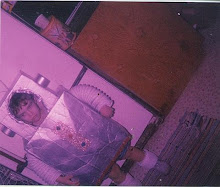No matter where I was, or how weird & crazy it got, everything would be okay if I could just make it Home.--Hunter S. Thompson
I guess I had this idea that everyone must have some similar landmark that could be the center of their universe. Some places have a mountain that’s always on the horizon. Maybe for some people it’s a grain silo. Maybe a tree. Maybe a flat field. Maybe an apartment building. The iconic mascot of a place that is home.--Phil Elverum
The thing is: I really don't feel like I have that. Technically, my hometown is a little town in Texas called Linden, but I left it before I was old enough to really establish an identity there. I moved back when I was twenty years old and spent the next four years or so there, but I made no friends and felt no special connection to the place beyond the family I had there.
The years between my time in Linden were spent in an even smaller town in Louisiana, and I suppose that technically I feel more at home there than I do in Texas—if I go there I can see familiar faces, and most of my adolescent memories are tied up in that place—but I don't really know anyone there anymore, I have no family in the area, and so there is no reason for me to go back.
If I had any one place that I felt was totally mine to call home—“my own personal Lighthouse that I could see from anywhere in the world” as Hunter Thompson put it—it would probably be my grandparents' home in Texas, just outside Linden in an unincorporated community called Bear Creek. We lived with them off and on throughout my early childhood and following my parents' divorce and, when I returned to Linden to attend school and spend long graveyard shifts working at the EZ Mart, I lived in their home while they separately went about the slow business of dying, and I lived there in the house alone for nearly a year afterward before leaving it behind to live in an attic in Arkansas.
The house had always been the place for the entire family to gather. My grandparents had five children, so there were a lot of grandchildren. I have nearly a dozen cousins, and there would usually be a couple of weeks in the summer when most of us were running around outside getting bitten by ants and playing in the dirt. Holidays were always a big to-do, with thirty of us easily packed into the house, the adults playing Moon or Forty-Two, domino games that I never learned to play despite their soundtrack—the clack of the tiles and the laughter of grown-ups—playing constantly in the background of the first twelve years or so of my life.
But naturally, as my grandparents became more frail and as the cousins got older and went off to school or got married or had children of their own, coming home to Bear Creek became less of an option, and by the time my grandfather died in September of 2002, the house had ceased to be the gathering place for the family.
(He built it himself, almost literally. He worked in the mill at Lone Star, then would come home and between tending to the cattle or the two gardens, he built the house that stands there now. Working off and on like that, it took somewhere around a decade. I can't imagine having that kind of strength or dedication, and I can't really imagine I'll ever have it.)
But no one really wanted to live there. They had their own homes, their own lives And so the house went on the market and, after a year or so, it finally sold, and passed out of our hands.
It seems like those memories, and the things that happened there, in that place, were a hundred years ago, and happened to someone else.
Moving over to Substack
11 months ago



